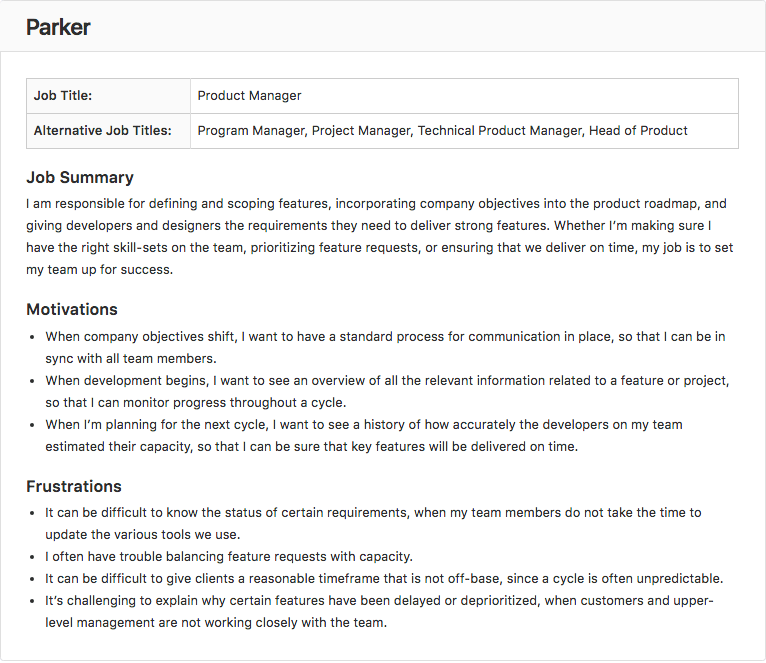Recently I spoke with several product managers and asked them about their experiences, as part of our effort to create personas for every one of GitLab's product areas. I gained a lot of insight through these interviews, including a better understanding of their daily duties, goals and motivations, challenges they face in their roles, and the tools they use throughout the software development lifecycle. Many of the findings have been included in our new Product Manager Persona, Parker, to help our own PMs brainstorm improvements and next steps for GitLab features. You can peruse the highlights and the persona itself below, and let us know what you think by tweeting us @gitlab!
The research
Here are some of the findings from my eight interviews conducted for the persona.
So, what’s the hardest part about being a product manager?
The product manager persona represents people who are responsible for prioritizing feature requests, product roadmapping, and tracking progress of the development of software applications. Since many of these factors depend on how other team members perform, most challenges related to communication and ensuring that their team delivers on time.
Staying updated on team progress and important decisions
It can be difficult to know the status of certain requirements when other team members do not update the various tools that are being used. Important information can get lost along the way, which often leads to repetitive discussions or fixing incorrect work. Users were looking for ways to have this information readily accessible and consistently communicated throughout their teams.
"Getting other people to use the tools. I need to make sure that other people are updating the Jira board for example – in my experience, many developers don’t exactly love to do this since it’s a tedious task. Or, if they have a question, adding it in the task so that we can keep a record of everything that’s being worked on. Sometimes someone will send me a question on Slack and I’ll copy-paste that into the ticket since sometimes it’s easier for me to do that than to ask someone to get used to doing that."
Prioritizing features to build when dealing with limited resources
Product managers are often responsible for defining and scoping features, incorporating company objectives into the product roadmap, and giving developers and designers the requirements they need to deliver strong features. As a result, product teams often have trouble balancing feature requests with development capacity.
"...Being able to find balance between being strategic and being practical. Being able to look into the future and be ambitious while at the same time having to put out fires and manage the day-to-day. Another challenge is staying in touch with the end user. We do not have as much time to be on top of the market and to interview customers. We're not as able to get market feedback and do market research as well..."
Simplifying information
for the different stakeholders involved in the product
The need to give clients and stakeholders timelines and estimates that are accurate but also realistic can be very stressful for a product manager. This is largely due to the fact that a cycle is often unpredictable. It can also be challenging to explain why certain features have been delayed or deprioritized, when customers and upper-level management are not working closely with the team.
"Some of the challenges of working with the technical team leads is that they will forget to update things or they’ll give me a summary that is super technical so I have to ask more questions to make sure that I understand and have the ability to explain to other product managers where the developers are stuck, because they need more definition on what that feature should look like."
What motivates a product manager?
Product managers generally are motivated by the desire to deliver high-quality features in a timely manner. When company objectives shift, they want to have a standard process for communication, so that they can be in sync with all team members. They need to see an overview of all the relevant information related to a feature or product, so that they can monitor progress throughout a cycle. Additionally, they want to be able to help their teams accomplish more of their goals over time.
What’s the best part about being a product manager?
All in all, the interviewees all expressed the joy they receive from simply doing their jobs, whether that’s improving life for users or speeding up processes within the company. The best part of being a product manager is the opportunity to bring a concept to life and solve real problems for their users.
The persona

Keep an eye out for the rest of our series on the new personas!
Photo by Hello I'm Nik on Unsplash



